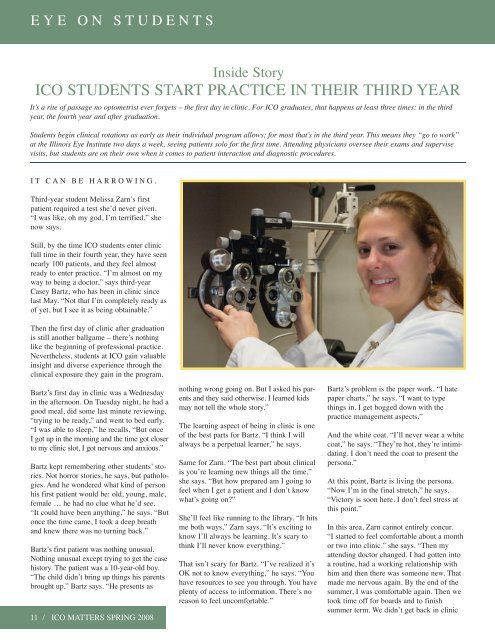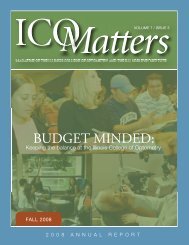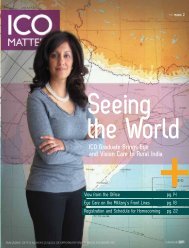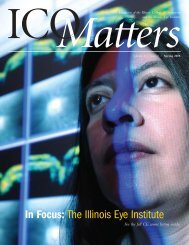Issue Management Management Issue - Illinois College of Optometry
Issue Management Management Issue - Illinois College of Optometry
Issue Management Management Issue - Illinois College of Optometry
Create successful ePaper yourself
Turn your PDF publications into a flip-book with our unique Google optimized e-Paper software.
Z6768_01:Layout 1 3/25/08 3:48 PM Page 12<br />
E Y E O N S T U D E N T S<br />
Inside Story<br />
ICO STUDENTS START PRACTICE IN THEIR THIRD YEAR<br />
It’s a rite <strong>of</strong> passage no optometrist ever forgets – the first day in clinic. For ICO graduates, that happens at least three times: in the third<br />
year, the fourth year and after graduation.<br />
Students begin clinical rotations as early as their individual program allows; for most that’s in the third year. This means they “go to work”<br />
at the <strong>Illinois</strong> Eye Institute two days a week, seeing patients solo for the first time. Attending physicians oversee their exams and supervise<br />
visits, but students are on their own when it comes to patient interaction and diagnostic procedures.<br />
I T C A N B E H A R R O W I N G .<br />
Third-year student Melissa Zarn’s first<br />
patient required a test she’d never given.<br />
“I was like, oh my god, I’m terrified,” she<br />
now says.<br />
Still, by the time ICO students enter clinic<br />
full time in their fourth year, they have seen<br />
nearly 100 patients, and they feel almost<br />
ready to enter practice. “I’m almost on my<br />
way to being a doctor,” says third-year<br />
Casey Bartz, who has been in clinic since<br />
last May. “Not that I’m completely ready as<br />
<strong>of</strong> yet, but I see it as being obtainable.”<br />
Then the first day <strong>of</strong> clinic after graduation<br />
is still another ballgame – there’s nothing<br />
like the beginning <strong>of</strong> pr<strong>of</strong>essional practice.<br />
Nevertheless, students at ICO gain valuable<br />
insight and diverse experience through the<br />
clinical exposure they gain in the program.<br />
Bartz’s first day in clinic was a Wednesday<br />
in the afternoon. On Tuesday night, he had a<br />
good meal, did some last minute reviewing,<br />
“trying to be ready,” and went to bed early.<br />
“I was able to sleep,” he recalls, “But once<br />
I got up in the morning and the time got closer<br />
to my clinic slot, I got nervous and anxious.”<br />
Bartz kept remembering other students’ stories.<br />
Not horror stories, he says, but pathologies.<br />
And he wondered what kind <strong>of</strong> person<br />
his first patient would be: old, young, male,<br />
female … he had no clue what he’d see.<br />
“It could have been anything,” he says. “But<br />
once the time came, I took a deep breath<br />
and knew there was no turning back.”<br />
Bartz’s first patient was nothing unusual.<br />
Nothing unusual except trying to get the case<br />
history. The patient was a 10-year-old boy.<br />
“The child didn’t bring up things his parents<br />
brought up,” Bartz says. “He presents as<br />
11 / ICO MATTERS SPRING 2008<br />
nothing wrong going on. But I asked his parents<br />
and they said otherwise. I learned kids<br />
may not tell the whole story.”<br />
The learning aspect <strong>of</strong> being in clinic is one<br />
<strong>of</strong> the best parts for Bartz. “I think I will<br />
always be a perpetual learner,” he says.<br />
Same for Zarn. “The best part about clinical<br />
is you’re learning new things all the time,”<br />
she says. “But how prepared am I going to<br />
feel when I get a patient and I don’t know<br />
what’s going on?”<br />
She’ll feel like running to the library. “It hits<br />
me both ways,” Zarn says. “It’s exciting to<br />
know I’ll always be learning. It’s scary to<br />
think I’ll never know everything.”<br />
That isn’t scary for Bartz. “I’ve realized it’s<br />
OK not to know everything,” he says. “You<br />
have resources to see you through. You have<br />
plenty <strong>of</strong> access to information. There’s no<br />
reason to feel uncomfortable.”<br />
Bartz’s problem is the paper work. “I hate<br />
paper charts,” he says. “I want to type<br />
things in. I get bogged down with the<br />
practice management aspects.”<br />
And the white coat. “I’ll never wear a white<br />
coat,” he says. “They’re hot, they’re intimidating.<br />
I don’t need the coat to present the<br />
persona.”<br />
At this point, Bartz is living the persona.<br />
“Now I’m in the final stretch,” he says.<br />
“Victory is soon here. I don’t feel stress at<br />
this point.”<br />
In this area, Zarn cannot entirely concur.<br />
“I started to feel comfortable about a month<br />
or two into clinic.” she says. “Then my<br />
attending doctor changed. I had gotten into<br />
a routine, had a working relationship with<br />
him and then there was someone new. That<br />
made me nervous again. By the end <strong>of</strong> the<br />
summer, I was comfortable again. Then we<br />
took time <strong>of</strong>f for boards and to finish<br />
summer term. We didn’t get back in clinic









